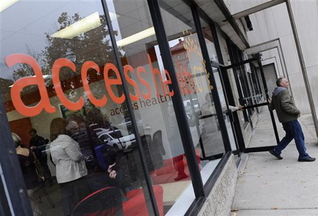WASHINGTON — President Barack Obama says he’ll do everything he can to help people coping with health insurance cancellations, but legally and practically his options appear limited.
That means the latest political problem engulfing Obama’s health care overhaul may not be resolved quickly, cleanly or completely.
White House deputy spokesman Josh Earnest said Friday that the president has asked his team to look at administrative fixes to help people whose plans are being canceled as a result of new federal coverage rules. Obama, in an NBC interview Thursday, said “I am sorry” to people who are losing coverage and had relied on his assurances that if they liked their plan, they could keep it.
The focus appears to be on easing the impact for a specific group: people whose policies have been canceled and who don’t qualify for tax credits to offset higher premiums. The administration has not settled on a particular fix and it’s possible the final decision would apply to a broader group.
Still, a president can’t just pick up the phone and order the Treasury to cut checks for people suffering from insurance premium sticker shock. Spending would have to be authorized by law.
Another obstacle: Most of the discontinued policies appear to have been issued after the law was enacted, according to insurers and independent experts. Legally, that means they would have never been eligible for cancellation protections offered by the statute. Its grandfather clause applies only to policies that were in effect when the law passed in 2010.
More than five weeks after open-enrollment season started for uninsured Americans, Obama’s signature domestic policy achievement is still struggling. Persistent website problems appear to have kept most interested customers from signing up. Repairs are underway. Friday the administration said the website’s income verification component will be offline for maintenance until Tuesday morning. An enrollment report expected next week is likely to reflect only paltry sign-ups.
Website woes have been eclipsed by the uproar over cancellation notices sent to millions of people who have individual plans that don’t measure up to the benefits package and level of financial protection required by the law.
“It was clear from the beginning that there were going to be some winners and losers,” said Timothy Jost, a law professor at Washington and Lee University in Virginia, who supports the health overhaul. “But the losers are calling reporters, and the winners can’t get on the website.”
In the House, a Republican-sponsored bill that would give insurers another year to sell individual policies that were in effect Jan. 1, 2013, is expected to get a floor vote late next week. In the Senate, Louisiana Democrat Mary Landrieu has introduced legislation that would require insurers to keep offering current individual plans. Democrats, who as a group have stood firmly behind the new law so far, may start to splinter if the uproar continues.
The legislation faces long odds to begin with, but it may not do the job even if it passes. The reason: States, not the federal government, regulate the individual insurance market. State insurance commissioners have already approved the plans that will be offered for next year. It may be too late to wind back to where things stood at the beginning of this year.
“It has taken the industry many months to rejigger their systems to comply with the law,” said Bob Laszewski, a health care industry consultant. “The cancellation letters have already gone out. What are these guys supposed to do, go down to the post office and buy a million stamps?”
The insurance industry doesn’t like the legislative route either. “We have some significant concerns with how that would work operationally,” said Robert Zirkelbach, spokesman for the trade group America’s Health Insurance Plans.
Behind the political and legal issues, a powerful economic logic is also at work.
Shifting people who already have individual coverage into the new health insurance markets under Obama’s law would bring in customers already known to insurers, reducing overall financial risks for the insurance pool.
That’s painful for those who end up paying higher premiums for upgraded policies. But it could save money for the taxpayers who are subsidizing the new coverage.
Compared with the uninsured, people with coverage are less likely to have a pent-up need for medical services. At one point, they were all prescreened for health problems.
A sizable share of the uninsured people expected to gain coverage under Obama’s law have health problems that have kept them from getting coverage. They’ll be the costly cases.
Obama sold the overhaul as a win all around. Uninsured Americans would get coverage and people who liked their insurance could keep it, he said. In hindsight, the president might have wanted to say that you could keep your plan as long as your insurer or your employer did not change it beyond limits prescribed by the government.
Meanwhile, Rep. Darrell Issa, R-Calif., chairman of the House Oversight Committee, said late Friday he had issued a subpoena to Todd Park, Obama’s top adviser on technology, to appear before his committee next week. The White House has said Park is too busy trying to fix the health care website to appear.
Send questions/comments to the editors.



